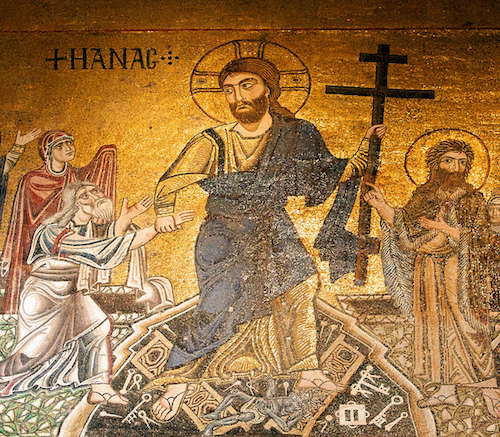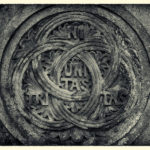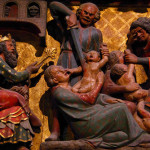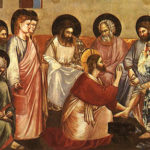We run our website the way we wished the whole internet worked: we provide high quality original content with no ads. We are funded solely by your direct support. Please consider supporting this project.

How the Anabaptists Emphasized the Cross
Because the Anabaptists have generally emphasized faith that is evidenced by works and thus on Jesus’ life as an example to be followed, it may prima facia appear that the saving work of the cross was less central to the early Anabaptists than it was to the Reformers and to Evangelicals. In reality, I would argue, this is not at all the case.
Given how persecuted the early Anabaptists were, it’s not surprising that they rarely discussed atonement theories in a formal way, let alone that they never embraced any particular theory. However, when Sattler, Hubmaier, Denck and other Anabaptist leaders did write and speak about the work of Christ on the cross, they actually reflect aspects of each of the major models of the atonement in Church history. Yet, in summing up their views, Thomas Finger observes that, “[a]mong traditional models … Christus Victor can be called historic Anabaptism’s primary expression of Jesus work.” This is true, however, only “providing we add that they experienced this as more present and participatory, and more specifically shaped by Jesus’ life than most.”[1]
In other words, the central emphasis tended to be on the manner in which Jesus’ humble, self-sacrificial life and death defeated forces of evil. Yet, this emphasis was not only regarding what Jesus did for us; it included what Jesus does in us and through us. To use Finger’s terminology, their Christus Victor model was not only “conflictive” but “transformative.”[2] Because they understood Jesus’ cruciform way of defeating the powers to be something they are called to participate in, they refused to engage in violence, even as an act of self-defense when persecuted and martyred by other Christian groups.
In this light, I would argue that, in a wholly informal way, the early Anabaptists tended to integrate Jesus’ death with every other aspect of his life, which is precisely the position I argue in Crucifixion of the Warrior God. And so, while one doesn’t typically find as strong a formal emphasis on the saving significance of the cross among them as one finds among the Reformers and Evangelicals, I would argue the cross was no less thematically central to them than it was to these others.
If anything, I would argue it is more central inasmuch as the Anabaptists understood the cross not only to be the thematic center of everything Jesus was about, but also as the thematic center of everything his followers are to be about. As is the case in the NT, the early Anabaptists generally understood that to follow the one who lived a cruciform life and died a cruciform death, one must be willing to adopt a cruciform lifestyle.
[1] T. Finger, A Contemporary Anabaptist Theology: Biblical, Historical, Constructive (Downers Grove, IL: IVP, 2006), 350.
[2] ibid., 341, 343
Photo credit: Nick in exsilio via Visual Hunt / CC BY-NC-SA
Category: General
Tags: Anabaptists, Christus Victor, Cross, Cruciform Theology, Jesus
Related Reading

Twenty Arguments Against Cameron’s “The Lost Tomb of Jesus”
On March 4th, 2007, the Discovery Channel aired James Cameron’s much celebrated documentary, “The Lost Tomb of Jesus.” The documentary basically gives a new spin on an old discovery. In 1980, a first century tomb was discovered in Talpoit (a southern suburb of Jerusalem) that contained 10 ossuaries (that is, boxes that contain the remains…

Knowing the Eternal God
If all our knowledge about God is to be oriented around the cross, as I argue in many places (see this post for instance), what does this mean for how we reflect on God’s transcendence? In other words, how can we speak of God’s eternal being since there obviously was no cross within God prior…

Is the Bible History?
Even though I argued for interpreting the final form of the biblical canon as opposed to using the history behind the text in my post yesterday, I am not endorsing the radical post-modern view that biblical texts possess “semantic autonomy” and thus lack any historical referentiality. While I have no problem whatsoever accepting that God used folklore and myth…

When Jesus Referred to Canaanites as “Dogs”
Last week I discussed Paul’s harsh language regarding his opponents, the worst example being his reference to certain opponents as “dogs” (Phil 3:2). I suggested that such language simply reflects the fact that Paul wasn’t perfect, as he himself admitted. Several people pushed back on this suggestion by pointing out that Jesus once referred to…

Living Incarnationally
The Christian faith is centered on the belief that in Jesus Christ God became a human being. This is commonly referred to as the doctrine of the incarnation. It means that in Jesus, God became embodied. God left the blessed domain of heaven, was born in Bethlehem, and took on our humanity that we might…

Cruciform Theology in Four Steps
The culmination of the biblical narrative of the cross reframes everything about who God is, what it means to have faith in God, and how we read the Bible! The entire Old Testament leading up to the crucified Christ must be interpreted with a view toward discerning how it anticipates and points toward this definitive…
